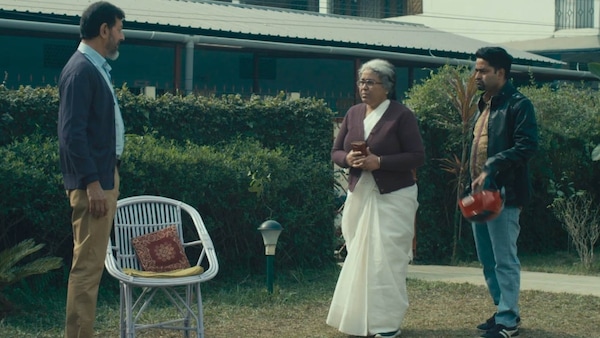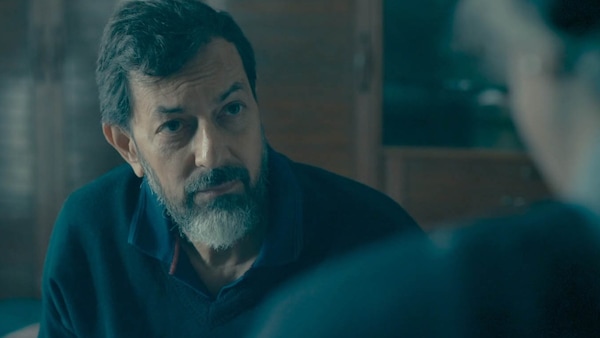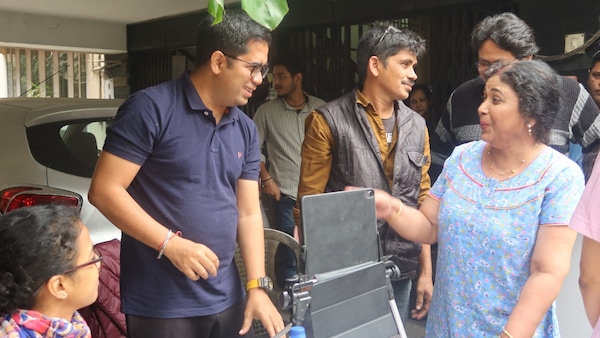Exclusive | Anur’s Jahanara Begum: ‘Homegrown stories are taking Assamese cinema into the mainstream’
Director Monjul Baruah’s Anur was named the ‘Best Assamese Film’ at the 69th National Film Awards. Here’s an exclusive interview with lead actress Dr Jahanara Begum

Dr Jahanara Begum in National Award-winning Assamese film Anur, also starring Rajat Kapoor
Last Updated: 01.37 PM, Aug 30, 2023
There’s no denying that the Assamese film industry is on the cusp of a new era. While the Ravi Sarma-starrer Sri Raghupati and the sequel to 70s cult hit Dr. Bezbarua (Dr. Bezbaruah 2) are widely hailed as commercial successes in recent times, offbeat projects like Rima Das’ Tora’s Husband, Bhaskar Hazarika and Kulanandini Mahanta’s Emuthi Puthi and Kenny Basumatary’s Local Utpaat are not bereft of a dedicated fanbase. However, the independent film that has recently made the northeastern state proud is the Monjul Baruah-directed Anur: Eyes on the sunshine, which bagged the ‘Best Assamese Film’ title at the 69th National Film Awards.
Based on a short story - titled Bhalpuwar Xomoi - by Sahitya Akademi Award-winning Assamese author Anuradha Sharma Pujaree, Anur boasts a stellar cast - including Dr Jahanara Begum, Rajat Kapoor, Boloram Das and Udayan Duarah. Apart from the ‘Rajat Kamal Award’, lead actress Jahanara has won a ‘Special Jury Mention’ for her performance in the film.
She is a well-known obstetrician in Assam, and a prominent name in the state’s theatre and film circuit, with over 60 plays and numerous awards to her credit. Recently, Jahanara made her OTT debut with National Award-winning director Samujjal Kashyap’s first web series Andolito Akax. Her performance in movies like Kaaneen: A Secret Search, Seema - The Untold Story and Xenophobia has also been widely appreciated in the past.
In an exclusive interview with OTTplay, the acclaimed actress spoke about what it means to win a National Award at this stage of her journey, how she juggles her medical and acting career, why she thinks homegrown stories from Assam have the potential to go mainstream, and more. Excerpts:
Also read: Andolito Akax review: Lima Das dazzles as a caregiver in Samujjal Kashyap’s stirring commentary on mental health crisis
Q. Anur: Eyes on the sunshine is as much a social story as it is a personal one. Tell us about your character in the film…
A. I had read Anuradha Sharma Pujaree’s Bhalpuwar Xomoi just before the pandemic, nearly two-and-a-half years ago. This was one of the three short stories that the book comprised. The narrative follows a retired maths teacher, Anupama Baruah, who after the death of her husband, is leading a desolated life in Guwahati. Since her son (Udayan Duarah) is now settled in the US with his family, her only acquaintance at home is her househelp (Rajashree Sharma) and tutee Niju (Bidya Bharati), who takes maths lessons with Anupama. Every now and then, she is also visited by a local shopkeeper, called Om Jyoti Das (Boloram Das), who helps her with other household requirements.

Despite her old age and daily struggles, Anupama is not someone who has lost her spirit and desire to lead a good and respectable life. Just like earlier times, she still loves to cook fish at home, run errands to the nearby vegetable market and carry on with her chores as much as possible. She is also financially independent, and would rather run on a budget than depend on her son for financial support. The only problem is that she is suffering from undiagnosed claustrophobia, owing to which sleep eludes her at night. So to get through the time, she starts reading a book.
Things take a pleasant turn when the character of Loshit Modliar (Rajat Kapoor) is introduced in the story. A former Deputy Commissioner, Loshit is a Hindi-speaking man who never left the state after his retirement. He now lives in the neighbourhood, and often walks into her lawn to get some sunlight in the morning. After being acquainted with Anupama for a while, he also offers to look after her when she falls ill, and even helps her identify her fear of confined places.
Anur dwells on themes of friendship, love and intimacy between two strangers during their old age, while the narrative also throws light on urban isolation and its physiological burden on the elderly. In the book, the short story ends with Loshit telling Anupama, “Let’s go on a holiday together.” To which, she responds, “What will people say, if we both head out together at this age.” He then asks her, “Are they your watchman?” However, in the movie, the director uses a non-linear style of storytelling that dabbles in a dream sequence to delineate Anupama and Loshit’s companionship.
Q. Be it the role of a helpless elderly woman in Anur or that of an Alzheimer’s patient in Andolito Akax, you have often managed to portray these delicate and difficult characters with finesse and empathy. How do you internalise?
A. I started taking interest in acting at the tender age of three-and-a-half years. After watching a film, I would come back home and spontaneously start enacting every character. Even as a child that gave me immense joy and satisfaction. Things took a concrete shape when my father, the late Mahbubar Rahman, began to notice my passion for acting. He would make me enact the monoacts that he used to write. I began with small performances in the front yard of our house in Nagaon. Then, I took part in shows at school functions and eventually started performing in the neighbourhood. I used to take a lot of interest in observing and understanding the different layers and intricacies of a character.
But despite that earnestness, I never took formal training in acting. Like my friend - noted theatre actor-director Baharul Islam - I did want to join the National School of Drama at one point. But when it came to choosing between my two passions - medical studies and acting - I decided to become a doctor instead and continue with my acting endeavours on the side. Thus, when it comes to the craft of acting, I have acquired all the knowledge from my father. He’s my guru. Be it while performing on the stage or in front of the camera, I have relied more on my naturalness and tried to immerse myself in the characters I portrayed.
I am an obstetrician by profession. On a typical day I divide my time between Tezpur Medical College and consultations at my private chamber. But my evenings are mostly about practising performing arts. I have created a studio in the basement of my house, in the memory of my father. It’s called Mahbub Studio. During those hours, I only attend calls if there’s a medical emergency pertaining to my patients. Otherwise, I try to keep the phone away and concentrate on acting.
Again whenever there is a film project, I go on leave so that I can fully devote my time to the character I am playing. Here, I must mention the support I have received from my family, particularly my husband Dr Gopendra Mohan Das, all these years. Even today, I feel excited about rehearsals like a little girl. They are the golden days for me. My husband often teases me about how I am full of energy and enthusiasm whenever I am preparing for a role. I believe that the ups and downs in life will always remain, but there’s nothing more life-like than acting.
I have also been fortunate enough to spend enough time with the script of the films that I have been part of. It allows me time to soak up unique traits and quirks of the character I essay on screen. I find it particularly intriguing if I am required to deeply research a character which is inspired by a real person. For instance, in director Hiren Bora’s period film Seema - The Untold Story [which also starred the late Nipon Goswami and Arun Nath], I played the character of a South Indian matron, who served at the Tezpur Mission Hospital [Baptist Christian Hospital] during the Chinese Aggression [Sino-Indian War] in 1962. I had about six months to prepare for this role, during which I visited the hospital at least 35 times just to gather information about how a matron would have functioned on a typical day at the hospital during that time. I made a note of even the smallest of details - be it the way she spoke or the manner in which she wore her uniform and cap. I also took help from a friend over the phone to grab the South Indian accent - precisely how she would communicate in English, Hindi or Assamese. I even engaged in conversations with some of my South Indian patients just to get the diction and style of speaking right. The audience loved my performance in the film. I even won two awards for that role.
Q. Tell us how you prepared for the role of Anupama in Anur…
A. We decided on adapting Bhalpuwar Xomoi from page to screen in just one day. Monjul and I were planning to work on a project together anyway. So, the day I finished reading this short story I immediately contacted the director and suggested that we pick this up for our next film. He too liked the piece, and so we contacted the author. In fact, the lockdown period kind of worked in favour of us, because it gave Monjul the time to work on the script, while I started building the character of Anupama.
To begin with, I had to put on a little weight and compromise with my skincare routine for several months, as the character is that of a poorly elderly woman. I also refrained from dyeing my hair for about two years, and started wearing a cap to hide my greys. Interestingly though, my son was getting married around that time, and he was quite worried about me flashing my grey streaks on his big day. But I somehow managed it with the help of hair patches that I had ordered online, so I didn’t really have to colour my hair.

It was a great team to work with. Be it Tarali, Garima, Rajashree, Bidya, the assistant directors or the spot boy - the friendly atmosphere on the set helped us give our best to this film. There were days when if there’s an early morning schedule the following day, we would all stay back at the house where we were shooting. These will remain as fond memories. Sadly though, my mother fell ill when I was working on this movie. She passed away just days after the filming was over, as if she was waiting for me to finish this project.
Q. Rajat Kapoor is a noted actor, director and playwright. Tell us about your experience of working with him?
A. We consider ourselves fortunate to have had Rajat Kapoor as part of this film. He was quite impressed after reading the script and gave a nod to it. Because it’s a regional project, he initially thought that his portions would be dubbed. But later when he realised that it’ll be sync sound, he wrote the dialogues in his own language - Devanāgarī script. We saw him putting in a lot of effort to get the pronunciation and diction right. If you have noticed, although Loshit is a North Indian, most of his dialogues were in Assamese, which in tandem with the demands of his character, he spoke in the style of a native Hindi-speaking person.
Even on the set, there was a lot to learn from him. In small-budget films, where you just have one camera which is used from different angles, the actor needs to be very careful about the minute details in the different shots taken. But he seemed to be a natural at that. Another interesting thing about Rajat is that he doesn’t carry a mobile phone with him. Instead, he prefers to communicate through emails, so that during the shoot, there is no disturbance or distraction whatsoever. On the set, he’s often seen in a jolly mood, sharing pleasantries with all the cast and crew members.

Q. Anur has won the prestigious ‘Rajat Kamal Award’ and you are honoured with a ‘Special Jury Mention’ for your performance in the film. How does it feel?
A. When it comes to my passion for acting, there are still a lot of things that I want to do. But I guess, age is a factor now. Of course, like everybody else I too expected my performance to be recognised and appreciated, but I never really thought that my dream would come true.
That said, I had faith in Anur and was somehow confident that our film would win an award. On August 24, I was offering my evening prayers to Sai Baba when Debojit Gayen called to break the news to me that I won a ‘Special Jury Mention’ at the 69th National Film Awards. Tears started rolling down and I went speechless after hearing it. A little later, Monjul called and congratulated me, adding that Anur bagged the ‘Rajat Kamal Award’. I still cannot express how happy and grateful I am to win this award.
Q. How do you perceive the growth of Assamese cinema today?
A. New-age Assamese filmmakers - like Monjul, Tanuj Nath (known for his dramedy Made in Nalbari) and the others - have brought new concepts and styles of storytelling into the industry. I consider that a huge plus point. What worries me, however, is that sometimes I feel the new and upcoming artistes and aspiring actors are not willing to dedicate themselves as much into learning the craft, and rather look for easier ways to master the ropes of acting.
Again when it comes to casting, I think it would be wise to allow the director of the film to make the decision according to the requirement of the script, instead of a producer taking that call.

While commercial movies are loved by the audience and they also perform well at the box office, independent projects like Anur have also run housefull shows in Guwahati, Tezpur, Jorhat, Sonari and at other places. However, despite its bright prospects, Anur couldn’t do as much business back in January, because just a week after its release, Dr. Bezbaruah 2 had hit the cinemas, and we struggled to get the slots. It did feel a bit discouraging at that point, but people who managed to watch the film on the big screen loved it, and we garnered a lot of praise and attention through social media too.
Q. Anything that you really liked watching recently?
A. I watch a lot of old and new movies on OTT and even otherwise. I usually enjoy movies that centre on human relationships - be it old Assamese films, Satyajit Ray classics, South Indian films or even something like Amour. Among the recent ones, I found the performances in Scoop and The Great Indian Kitchen truly remarkable.
Subscribe to our newsletter for top content, delivered fast.

